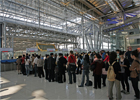| |
Thailand is functioning economically in the sense that it has a healthy agriculture, well-balanced service and industrial sectors, and a growing tourism industry. But all that is just words, spoken by economists who never see the human factor.
I am taken to place that technocrats cannot begin to imagine. Our agricultural sector is full of poverty, supporting 40% of the population, 30 million souls, but contributing just 9% to GDP. Worse, when you look more closely, these 30 million people have accumulated more than they can ever repay.
That aside, when I look at the industrial and service sectors, I am perturbed by their unchecked growth, which is rapidly polluting and degrading our precious environment, and damaging our health. Even tourism, billed as the sector that claims to be able to accommodate and make 10 million people from abroad happy every year, has taken a comprehensive toll on the ecology, and damaged whole communities and local livelihoods beyond recognition.
If you should just look at economic considerations and disregard the side effects, you might think Thailand is a wonderful success story, but I can’t help but seek solutions for a more realistic growth in Thailand, and a sustainable one. And in fact, despite all of Thailand’s deep problems, I remain optimistic.
My dream Thailand has been destroyed time and again by the earnest promises of successive governments to solve the poverty problem. In reality, every single government since the 1960s has had just one goal, which is to enrich the capital sector. And they pretend that they are trying to govern the entire population as a whole.
However, I am not disillusioned by all this and in fact if one can make a difference, just a tiny difference, I will be content, remembering my father’s words that ‘in politics, to win 50 % is like winning 100 %’.
Another threat to our social fabric is that increasingly we are becoming a heartless society. Because of our single-minded obsession with growth we have come to ignore the rising influx of unskilled, low paid workers, no longer Thais, but Burmese of all ethnic complexions, and Cambodians, perhaps 3 million or more in total. These now live and work as low cost unskilled labour in factories in Samutprakarn, in Maesod, Tak, in Rayong, Ranong, and elsewhere. For Burmese exiles, everyone is stateless once they leave Burma. They remain stateless as long as they live in Thailand because they are not Thai citizens, and are no longer considered Burmese. Stripped of their citizenship, with no rights or privileges, only recently has Thailand started to provide such unfortunate migrants with health care. This is done not for altruistic or compassionate reasons, but only as a preventive measure to prevent the spread of communicable diseases. Very few get any education at all. Their status is basically similar to those described for workers in the late 19th century.
We have advanced in many areas but to our shame we have regressed as far as migrant workers are concerned. There have never been any state policies to address this problem.
It is good that Thaksin registered 300,000 out of 1 million working migrants. But this is only a drop in the pond.
This mentality also influences our treatment of other minorities who should have been given Thai citizenship a long time ago; for example, the huge influx of Burmese into Thailand since 1966, who have not been granted citizenship rights in the north, though they have been part of Thailand’s image for decades, and indeed for entire generations.
Thailand’s unhumanitarian policy towards migrants is shortsighted. Our industries need them for their factories, and the country’s faltering image and standing in the international community would benefit enormously from more liberal and humane treatment of these needy people. When Thailand is recognized as a modern-day contemporary state, there will surely be political as well as economic dividends, and Thailand can once again hold its head up and look the world in the eye.
Where would you start?
Without doubt, I would start with agriculture. If we look at it realistically, Clearly, one of the major problems is their indebtedness, which results from usurious credit terms and poor farm gate prices. They are in fact indebted even before they sell their produce; even if the price is good, they are burdened with the debt they must carry. The more incentive for credit, the deeper they sink into debt.
Their dependence on informal high-interest loans from moneylenders stems largely from their lack of collateral. We also have to recognize that Thailand is no longer a country of small farmers, no longer comprised of thousands of farming communities living idyllically on their own land. Today most no longer o own the land they farm. It is a fact that many Thais are landless, working on land belong to the government or to private landowners.
The situation was made even worse by the bubble economy of the early 1990s, when the corporate class went berserk buying land all over Thailand for speculation. Whole islands were snapped up, and huge tracts of land were bought up in the north, which now belong to urban elites. And all of this has resulted in the indebtedness which we have discussed above, and a dispossessed rural population. It will take a very gutsy government to see, and tackle this issue, and risk losing the support of business elites. Still, the land belongs to the people, and should be returned to the people.
Give to whom?
We should return the land to those people who live and work on the land. This is technically not difficult, but will require tremendous political courage to accomplish. Any post-election government that raises land reform as a priority measure against poverty stands easily to gain overwhelming support in both the north and northeast regions.
Of course, land reform is not new, but has proceeded in fits and starts. In the 1990s when the Democrats were in power, they gave away 4 million rai of land to 200,000 families in the south. In the past 10 years, over 1 million families have benefited from this, but still there are millions and millions more who need help. Over the past 10 years land reform has stalled due the scandal under the first Chuan government, although this stemmed from just two cases, involving land mistakenly given to an MP’s husband in Phuket.
Since then, we have shied away from the issue, even though it is the most progressive policy any party could have. If Democrats want to beat Prachachon party through a more realistic and relevant manifesto, they should seriously consider resurrecting measures to redistribute land to small famers.
Environmental issues are another issue. The state needs to assign far more resources to this, but as with land reform, it will take a great deal of courage and political will to drive through unpopular measures that will impact on short term corporate profits. However, a failure to act now will drain Thailand’s lifeblood. We have one of the most modern petrochemical industries located in Mak Ta Phut and Rayong povinces The incomes of these two provinces exceeds that of the entire northeast region, and yet they are also amaong the most polluted locations in the world. I have received damning reports beyond my comprehension, showing that Rayong and Cholburi have elevated incidences of blood-related cancers, the highest rate of DNA defects, and high levels of atmospheric and water pollution. In these provinces water resources, agricultural lands, gardens, and soils are heavily polluted. Remediation might not be feasible but simple measures if implemented now could bring about huge reductions in pollution levels. The experience of countries such as Japan, Taiwan, and within the EU, which have addressed the problem through much higher standards, controls, regulations, laws, and monitoring bodies, and penalties. However, Thailand has yet to put together anything like a comprehensive and convincing policy for environmental protection. The need is desperate- if we are to coexist in this, our fragile country, in an increasingly fragile world, we have to start now.
Regional issues
In the past Thailand has been the key to regional peace. It should also have been a major player in the case of Burma. To our shame, successive governments have paid lip service to international calls for action on Burma, whilst profiting from this brutal and oppressive regime. We are also apparently happy to pay the price for Burma’s 40 years of oppression – that is the constant and massive migration of refugees into Thailand.
I believe that Thailand should work through ASEAN, and collaborate with China and India in bringing about change in Burma. But we have to be single mindedly clear that such efforts should lead to the democratization of Burma, or at least national reconciliation.
All this is not to say that we hate the Burmese as a people or nation, although Thailand’s past ultra- nationalist policies have in fact given us this nasty streak of looking down upon the Burmese, be they Mon, Karen, Burman. We have to realize that our northern civilization is closely connected to Burma, particularly to the Shan states, and historically, Thailand’s emergence as an independent nation is closely intertwined with those of Laos and Cambodia. I don’t think there would be Angkor without Pimarn, and there would not be a Sukhothai without Angkor. We are very much the product of influences by our neighboring countries.
Whatever our government does, we should all respect our neighbours’ own cultural needs and identity, and not overwhelm them, thinking we are superior. So, if we look at how we currently are attempting to address the southern troubles, we see how we treat our own people with contempt, with sheer unmitigated suppression methods inflicted on a very proud Muslim community in the south. To use unrestrained force resistance to quell insurgency in the minority, created a much bigger problem that could have been avoided. It is unprecedented to see Thais exchange insults on a daily basis, including our leaders and their Malaysian counter parts, over the issues in the south when we were clearly in the wrong. This has led us to probably the most worrisome relations with the Malaysian and Indonesian governments, and there is assuredly no end in sight.
Thaksin epitomized much of what was wrong with Thailand, vis à vis the State’s relations with its own people, and neighboring countries. Even the fact that ours has long been a multicultural society has not been recognized by the State, except through token recognition of specific cases, usually granted only under political duress and media pressure. This is perhaps one of the biggest failures in Thailand’s cultural polices, and should be radically modernized in order to comply with international norms and accepted ethical principles. •
|
|



 |
|













